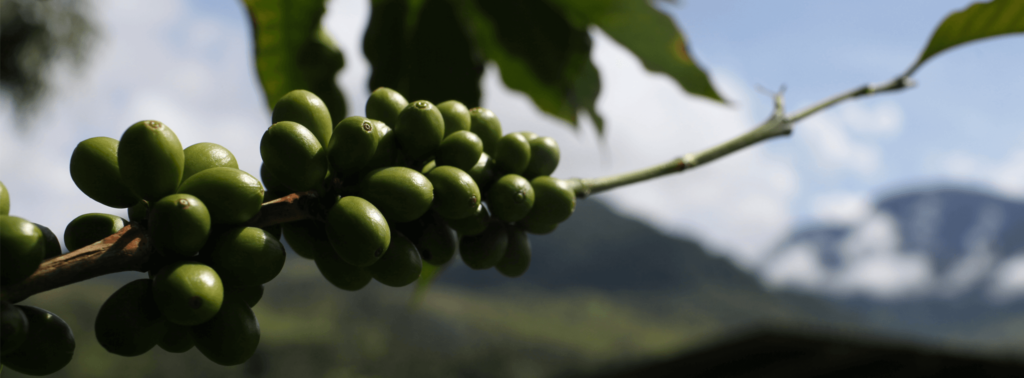COOPEAGRI is a large co-operative located in the Perez Zeledon region in the south of Costa Rica. Coffee is its main cash crop.
About COOPEAGRI
COOPEAGRI was founded in 1962 by 391 small-scale farmers with the aim of building a strong farmers’ organisation to improve living standards and bring dignity and development opportunities to their communities.
Fairtrade as a certification is much more than merely an environmental certification, it is the only and best ethical and social certification.
Enrique Calderon, Department of International Operations, COOPEAGRI
Today they have over 8,000 members growing coffee on plots averaging 1.3 hectares. They also employ over 700 temporary and permanent workers. In all, COOPEAGRI reaches 35,000 farmers, workers and their family members.
From initially owning a small coffee processing plant to add value to their crop, the co-op has expanded into a range of commercial activities. It now produces and markets organic manure on a commercial scale, and has diversified into sugar cane and other agricultural products. It has purchased a sugar mill and a new coffee processing plant – with 25 times the capacity of the original one – where members’ coffee is processed before delivery to the county’s biggest exporter for final processing and export.
Coffee quality is evaluated and monitored at its own cupping laboratory – positive and negative characteristics are identified and producers are advised how to improve processes to ensure the commercial quality of the product. The co-op markets its own-brand roast and ground coffee locally but high tariffs imposed by importing countries to protect domestic roasters effectively prevent export of the product.
The co-op also carries out reforestation, water conservation and environmental educational programmes as part of its long-term strategy of sustainable development.
Fairtrade
The co-op was Fairtrade certified for sugar cane 1998 (Fairtrade sales account for around 3 per cent of its 32,500 tonnes production) and coffee in 2004. They joined Fairtrade to achieve a fair and stable price for their coffee and to combat the radical price fluctuations in the conventional market which, along with rising costs of production and high labour costs, make it hard for farmers to meet their basic needs of food, water and fuel and pay for their children’s education. They also shared a vision with Fairtrade for consumers and business to recognise the hard work and dedication of the people behind Fairtrade products, the difficulties they face and the aspirations they have for their families.
There were initial difficulties in meeting Fairtrade standards, particularly improving documentation and product traceability. And supplies and sales of prohibited agro-chemicals had to be replaced with approved alternatives, at the considerable cost of lost sales to external customers. But these measures were vital to their aspiration of producing an environmentally friendly, sustainable product and extending access to Fairtrade markets.
Fairtrade certification provides opportunities to meet Fairtrade as well as conventional buyers at trade fairs in Europe, US and Latin America. Coopeagri has developed long-term relationships with Fairtrade buyers from US and Europe who have given financial assistance to a housing programme, installation of an irrigation system and construction of a computer lab for children, equipped with 20 computers.
Fairtrade Premium projects
For Fairtrade sales, Coopeagri is paid at least the Fairtrade Minimum Price (calculated to cover costs of production) or the market price if higher. They are also paid the Fairtrade Premium of 20 cents a pound to invest in business development and improvements to the 85 communities they serve. The co-op currently only sells around 10 per cent of production to Fairtrade so it is very keen to increase both sales and premium income.
Premium-funded projects include a medical clinic, community store and the construction of 160 coffee stores over an area of 90 square kilometres. Farmers deliver their coffee to the stores for collection and transport to the washing station, saving farmers considerable time and expense. It’s almost impossible for farmers to obtain bank loans as they are not considered creditworthy, so an interest-free loans scheme (repayment within 90 days) makes much-needed credit available.
A quarter of the premium must be invested in productivity and quality improvement. This is essential to increase incomes and improve competitiveness with other sought-after high quality coffees grown in the region, such as gourmet beans from the Tarrazzu highlands. The premium has made it possible to set up a unique technical assistance team, with four technicians, to implement a range of programmes:
- Individual farm visits to identify and solve specific problems
- Group farmer training and group discussions to share knowledge
- Experimental plots to develop new varieties that are more productive and more resilient to climate change, using simple techniques and technology that can be transferred to farmers
- Soil sterility is being addressed by soil analysis, application of corrective treatments (mainly organic manure to fix nutrients to plant roots), introduction of shade trees and reduced use of herbicides
- A plant nursery provides 1.5 million young coffee plants a year for farmers to renovate their fields at the discounted price of 100 colones rather than 180
- Diversification of production into cocoa, oranges, avocados and bananas, with technical support
- Production and sale of own-brand organic manure made from coffee and sugar cane waste matter
- Fertiliser scheme – distribution of organic manure to all members at subsidised prices.
